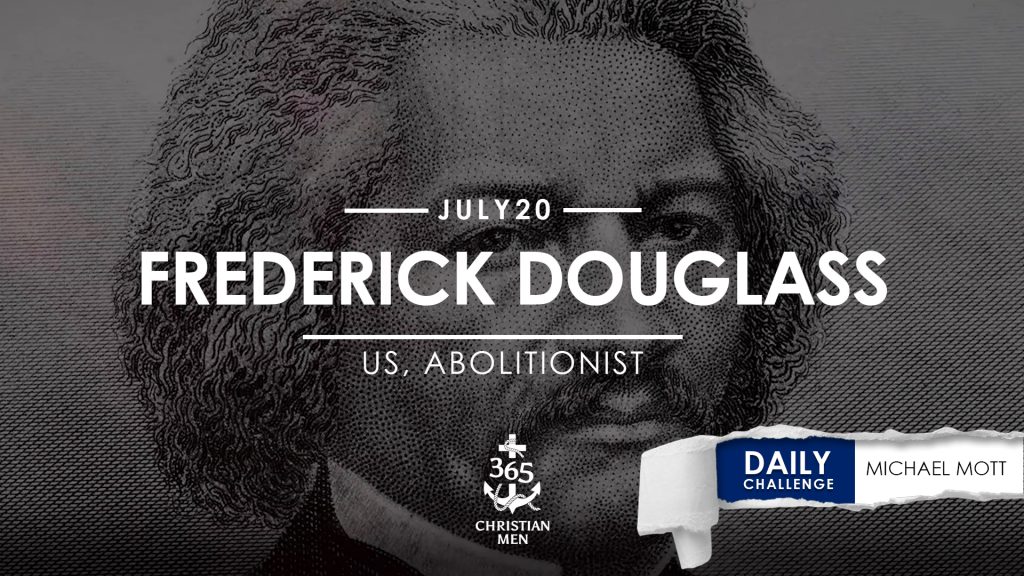July 20. Frederick Douglass. Douglass was born into slavery, found a way out for himself, worked to free others, and then used his new position to work toward freedom for other groups of people. On this date in 1866, Douglass spoke at the First Women’s Rights Convention.
Knowledge can be the pathway to freedom; gain it. Use it.
Born into slavery in 1818, Douglass was less than 10 years old when his master loaned him to the Aulds in Baltimore. When Mrs. Auld taught Frederick the alphabet, a new world opened to him. But when she showed her husband Douglass’s new skill, Mr. Auld became enraged and said that knowledge would ruin a good slave.
Douglass recalled, “‘Very well,’ thought I; ‘knowledge unfits a child to be a slave.’ … from that moment I understood the direct pathway from slavery to freedom.” Though Mrs. Auld punished Douglass if she caught him reading, when the Aulds weren’t home, Douglass practiced.
With a piece of biscuit, he bought spelling lessons from neighborhood boys. He also taught himself penmanship. At 13, he read the Columbian Orator, a collection of political essays and dialogs. “I had now penetrated the secret of all slavery and oppression … their true foundation [was] in the pride, the power, and the avarice of man.”
Freed from the lie that Divine design had made him a slave, Douglass reached out to God and kept trying to get more knowledge. He wrote, “Especially did I want a thorough acquaintance with the contents of the Bible.”
Mr. Auld eventually sent Douglass to work on the plantation, and there the boy used Scripture to teach the other slaves to read. But when white men with whips drove the students apart, the class ended.
Then Douglass was sent to a cruel taskmaster to be “broken,” abused physically and mentally, and he sometimes lost hope, but he never believed any man should be enslaved.
His next master was more reasonable. As Douglass’s wounds healed, he gained the strength to act on his knowledge. He lived the proverb: “The wise prevail through great power, and those who have knowledge muster their strength” (Proverbs 24:5 NIV).
He taught fellow slaves the virtues of learning, started a secret Sunday school, and soon had forty pupils. He planned an escape, but someone tipped off the master. After a short imprisonment, Douglass was sent back to Baltimore, where he plotted another escape. This time his plan worked.
Now a free man, Douglass read The Liberator, an abolitionist newspaper.
The abolitionists offered him a position as a traveling orator. As he grew in eloquence, audiences believed that he was too well-spoken to be a fugitive slave.
In response, Douglass shared details of his life, but this made him vulnerable to capture. The abolitionists sent him to England, where he would be safe. “A rude, uncultivated fugitive slave was driven by stern necessity, to that country to which young American gentlemen go to increase their stock of knowledge.”
The British press warmly received Douglass, and he enjoyed the company of English intellectuals, but after a time, duty drove him back to America. British friends purchased Douglass’s freedom papers and gave him enough capital to start a printing press. American abolitionists tried to talk him out of it, but Douglass persevered, and he wrote, “… the want of education, great as it was, could be overcome by study, and that knowledge would come by experience.”
What dream have you put on hold for lack of knowledge? Knowledge can be the pathway to freedom; gain it. Use it.
Biography.com. “Frederick Douglass Biography.” Published April 2, 2014. https://www.biography.com/activist/frederick-douglass.
Douglass, Frederick. “Life in Baltimore.” My Bondage and My Freedom. London, England: Partridge and Oakey, 1855.
Would You Like to Learn More About This Man?
Douglass’s autobiography, My Bondage and My Freedom can be accessed online at Lit2Go: https://etc.usf.edu/lit2go/45/my-bondage-and-my-freedom/ or purchased in print or electronic format at major retailers.
Story read by: Stephen Holcomb
Introduction read by: Daniel Carpenter
Audio production: Joel Carpenter
Editor: Teresa Crumpton, https://authorspark.org/
Project manager: Blake Mattocks
© 2020, 365 Christian Men, LLC. All rights reserved.





